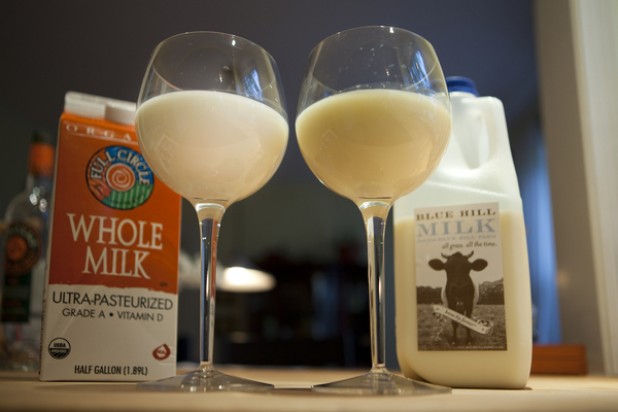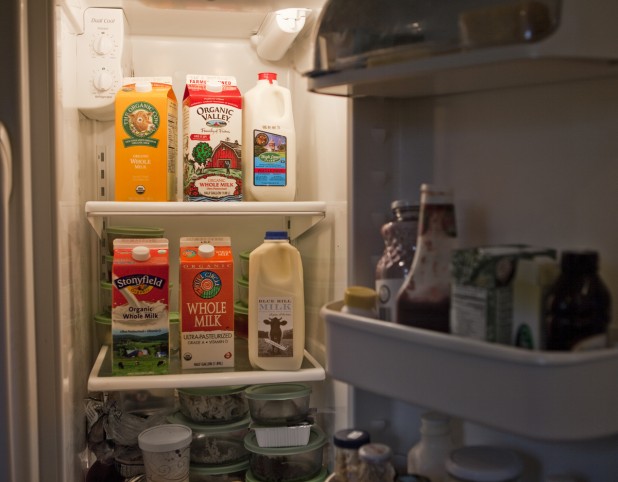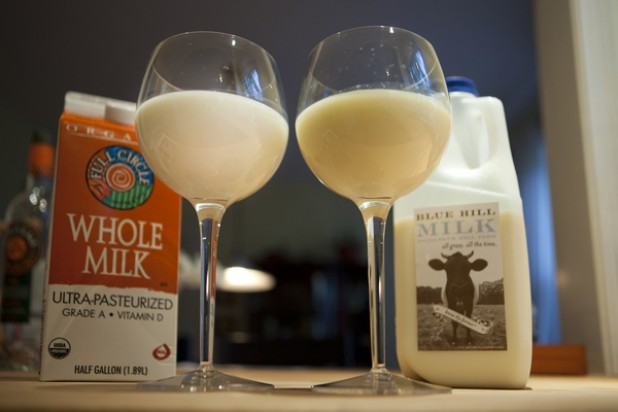 Full Circle’s ultra-pasteurized offering, versus small-farm Blue Hill’s raw milk: Which mooved tasters the most?(Photos by Jason Houston)
Full Circle’s ultra-pasteurized offering, versus small-farm Blue Hill’s raw milk: Which mooved tasters the most?(Photos by Jason Houston)
Putting aside for a moment the dietary arguments against drinking cow’s milk — we’re not calves, it’s liquid meat, it’s snot-producing, so hard to digest, etc. — conventional milk deserves vilification for many reasons. Conventional dairy’s ethically repulsive and planet-reaming process involves more or less torturing cows to lactate year-round; pumping their ailing, grain-fed bodies with hormones and antibiotics right up until they become hamburger; butchering their anemic offspring for scallopine and pet food; and, last but not least, polluting our own water supplies with both their excrement and agricultural runoff. Oh, wait. That wasn’t last. I forgot to mention that conventional milk is trucked hither and yon. But don’t take my word for any of this; here’s yet more information on the malevolent liquid that complements a slice of chocolate cake so nicely.
One way that milk lovers can sidestep these issues, at least in part, is to buy more sustainable forms of milk: certified (or in-spirit) organic and/or local. But if taste is the guide, as is so often is the case, is one of these morally better milks more delicious than the other? Or are they all just white, taste-neutral beverages?
I assembled a panel of tasters to sample six greener whole milks. Why whole, full-fat milk? Because I think it tastes better than low-fat and I’m the decider. That’s why. And before you ask, Horizon milk — the organic brand owned by Dean Foods that has the biggest market share by far — is conspicuously absent from this tasting because it isn’t sold in my local stores and didn’t want to burn tons of fossil fuel searching for it.
Notes: The more time the cow spends on pasture, the more likely the flavor of the cow’s milk is to change with the seasons. The milk we tasted last week might, at least in some cases, taste very different at other times of year. “Ultra pasteurized” refers to milk that has been heated at higher temperatures for longer, and has a shelf life of two to three months, and is alas often employed for organic milk, which is often shipped farther and is more expensive — and thus slower-selling — than conventional milk.
And now, the results …
Organic Valley Organic whole milk
Price: $4.99 per half gallon
Eco upside: Organic Valley is a farmer-owned cooperative. For this Massachusetts panel, that meant we drank a regional milk from New England pastures, one that’s USDA Certified Organic. Organic Valley says its cows are “raised humanely and given certified organic feed — never any animal by-products — and our pastures are certified organic.” On the downside: Although regional, the milk is still could be** trucked a fair distance and, not having visited the farms, who the heck knows how happy the cows are? Certified Organic mandates access to pasture, not actual time spent on it.
Feedback: Tasters were all over the map on this ultra-pasteurized milk, which was pure white. Comments ranged from “funky tasting” to “smooth and buttery.” Someone said it tasted like “raw milk,” with a grassy, moldy flavor. Overall, tasters liked the texture, which was described as “totally thick” and as having “legs that stick to the glass.” Overall rating: “Pretty good.”
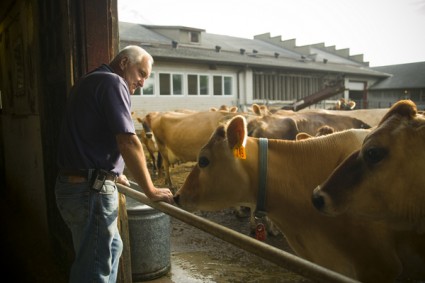 Jersey dairy cows at High Lawn Farm, in MassachusettsHigh Lawn Farm whole milk
Jersey dairy cows at High Lawn Farm, in MassachusettsHigh Lawn Farm whole milk
Price: $2.99 per half gallon
Eco upside: This local milk comes from a herd of pretty happy-seeming Jersey cows* from a charming, medium-sized dairy 12 miles from my house. This milk is not certified organic but the cows “feed off fresh grass in the summer months, and almost all of their winter feed comes straight from our corn and hay fields,” according to High Lawn’s website. The farm doesn’t use genetically modified seeds, harmful pesticides, or feed with animal byproducts or artificial hormones. Downside: The website also says that the farm purchases grains from agribiz villain Cargill to augment the corn and alfalfa it grows for both silage and hay.
Feedback: Eww. That’s what got blurted out at first sniff. After sipping, tasters were a little less sour on this all-white milk, but still deemed it “a little synthetic and boring.” “Nothing interesting,” said one taster, dismissively pushing his glass away. “The milk of my childhood,” yawned another.
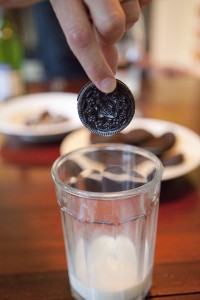 Full Circle organic whole milk
Full Circle organic whole milk
Price: $3.49 per half gallon
Eco upside: This is my local supermarket chain’s in-store, cost-conscious brand, which is USDA Organic. Downside: Where did the milk come from? How far was it shipped? Were these cows really content or merely greenwashed milk machines? I just don’t know.
Feedback: The panel got a bit drunk on this white milk, swooning with comments about the “clover in its nose” and its “earthy, creamy” and “sweet” texture. “I like this one a lot,” said one, while another said it was akin to drinking “light cream.” “This one deserves a cookie,” said one lady, who reached for a Newman-O (adding “I’m gonna get me some palm oil”).
The Organic Cow organic whole milk
Price: $3.79 per half gallon
Eco upside: This USDA Organic regional milk is sourced from “nearly 100 New England family farms.” Downside: New England is a fairly big region, so who knows how far the milk was trucked. The Organic Cow website offers, via the Fun Facts For Kids page, the bovine bit of trivia that a group of 12 or more cows is called a flink. Shockingly, the site does not offer the requisite meet-the-farmer-via-cheery-photo montage. However, the carton itself features a profile of a Vermont farmer — who appears to be a helluva nice guy — taking a relaxed-looking cow for a leisurely walk. Most important, the cow was wearing a bell. And as you know, you can never get too much cowbell.
Feedback: Swirling and sniffing like a wine enthusiast, one taster noted this ultra-pasteurized milk’s “nice grassy nose.” Its flavor, though, left panelists wanting. “We’re back to processed flavor,” sighed one man. “Super-homogenized!” said another. Texture-wise, a kinder taster allowed for “some creaminess,” whereas another found it to be “mouth-coating.”
Blue Hill Farm whole milk
Price: $4 per half gallon (paid in cash at the farm, no records for the gummint to find)
Eco upside: This local, unpasteurized (aka “raw”) milk comes from a picturesque farm owned by chef Dan Barber’s Blue Hill restaurant and situated a few miles from my house. Disclosure: The farmer is a friend of mine. The flink — 15 to be precise — of Dutch and Normande Belted ladies hang out on the rolling green pastures in the sunshine doing that swishy-tail thing. Downside: There’s a lot of controversy around the health and safety of raw milk. Advocates say the un-pasteurized stuff is healthier for cows, people and the earth; the FDA and even many greens say it’s a health hazard that could cause dangerous foodborne illnesses. Grist’s take is somewhat in the middle, and the Ethicurean has a detailed analysis of both the health and illness claims.
Feedback: Unlike the other “milky” white milks, Blue Hill’s was yellowish, like eggnog with a darker yellow ring. “Smells like a barn,” said one taster suspiciously. After tasting, someone hooted, “I love raw milk!”, while another gagged, saying “It tastes like I’m licking a cow’s ass.” Yet a third closed his eyes, sipped deeply, and confirmed cognitive dissonance theory: “It’s like silage, but I could acquire this taste.” The queasy taster, meanwhile, had pushed her chair away from the table and was eyeing her glass as if it were full of spiders. “I’m not putting that in my mouth again,” she wailed, to which another taster testily countered, “This is the only milk my kids will drink.” The wailer then crossed her arms while one of her “friends” snickered and made lewd milking gestures into her glass. Taste summary: “Very grassy.”
Stonyfield organic whole milk
Price: $4.49 per gallon
Eco upside: USDA Organic — but Stonyfield is a Big Organic operation, which means that its impacts, both good and bad, are magnified. The company gives 10 percent of its profits to green efforts. Downside: Stonyfield’s milk may have been sourced from far away**, even abroad, and who knows, despite the warm-and-fuzzy farmer profiles on its website, the cows could be lined up like cordwood at some huge, insensitive operation. The site does offer farm webcams, at least one of which showed cows that were indoors, not frolicking in the sunshine.
Feedback: This milk also earned mixed comments. The raw-milk lovers sipped it with a mix of Anna Wintour-ish disdain and disaffection: “It’s a basic milk,” someone sighed. Meanwhile, the raw-milk hater sniffled that it was “pure comfort — happy, cool, and sterile.” Most offered neutral comments “It makes me think of those little cartons,” and “a lunchroom milk.”
The bottom line
On taste alone, Full Circle’s ultra-pasteurized, in-store brand won this tasting, a result that will surely make the raw milk terroirists irate. Advice for dairy drinkers: No matter what you do, bag conventional milk. If you can, find a local dairy farmer you trust and let taste be your guide. And if you must reach for Big Organic, learn more about your potentially greenwashed beverage by checking out the Cornocopia Institute’s dairy report and scorecard. Lastly, consider drinking from the milk of human kindness and cutting back on animal foodstuffs altogether. But when it comes to dunking cookies, I think that’s easier said than done.
*Bovine factoid: Jersey cows‘ milk is not only naturally high in butterfat but also, according to High Lawn’s web authors, the rather smallish cows themselves possess the “most beautiful, doe-like face of the entire bovine kingdom.”
** May 26 update: After this article was published, we received a cranky email from Stonyfield, stating (among other things) that Stonyfield milk, like Organic Valley’s, is “sourced from the 1,652-member CROPP Cooperative, the nation’s leading organic dairy cooperative.”

